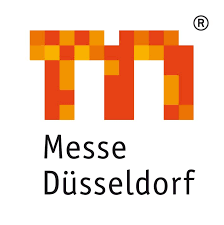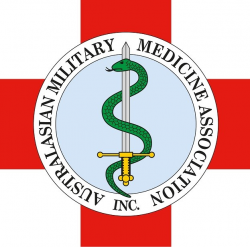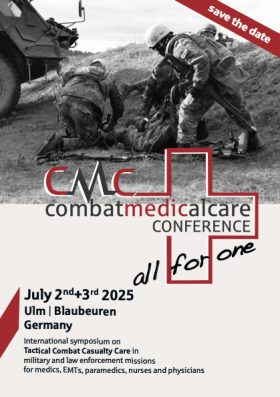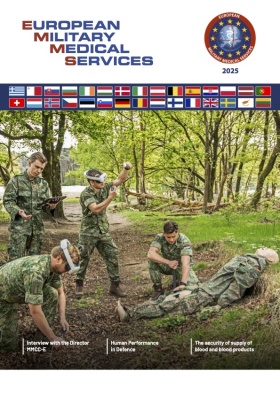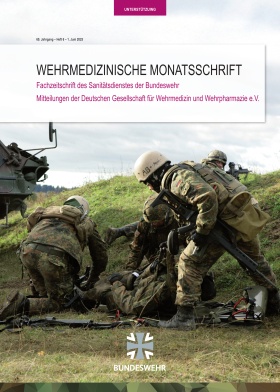
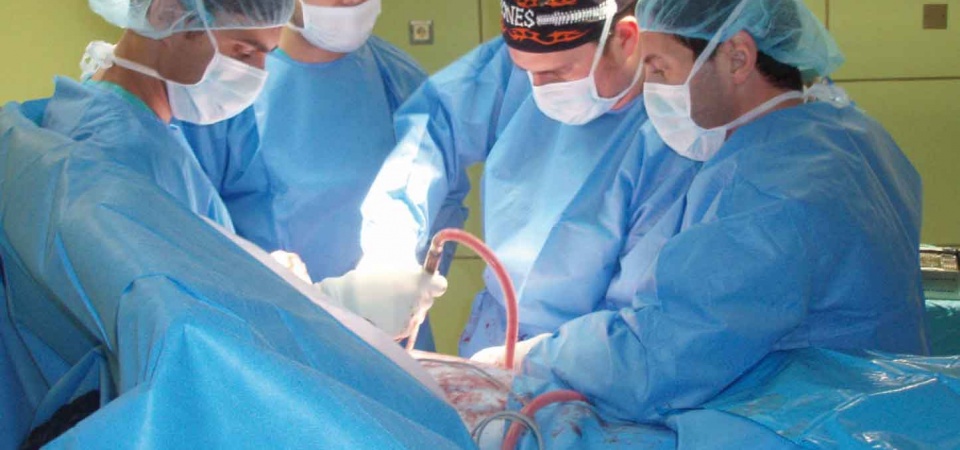
Article: A. SUDA (Austria)
Surgical Support in Benghazi – A Libyan Experience
In March 2012, the author was asked to be part of a humanitarian missionto help Libyan people build up a new medical service.
The plan was to send surgeons, physiotherapists, OR-staff nurses and psychologists to two hospitals in Libya to support the local medical staff in their efforts.
In the early days of March 2012, I was asked by a friend, he is Lt. OF-1 (Reserve) Austrian Armed Forces, to be part of a humanitarian mission to help Libyan people after the revolution in this huge north-african country still in civil war conditions: new free Libya. The plan was to send surgeons, physiotherapists, OR-staff nurses and psychologists to two hospitals in Libya to support the local medical staff in their effort on building up kind of a medical treatment under the new government and next to the revolutionists who have still power in several regions of the country.
The Austrian-Libyan society organized local contacts with WAFA (“We are for all”), a Libyan welfare organization founded by Libyans from the United Arab Emirates, Austria and Great Britain. Three trauma surgeons, two plastic surgeons as well as a conservative orthopedic, anaesthesiologists, psychologists, physiotherapists and nurses planned their trip to Libya and were excited about what was going to happen in these 13 days in early may 2012 scheduled for this mission.
The flight to Libya was organized and performed by the Austrian Airforce. The team flew from Linz-Hörsching, the Austrian Military Airport in the middle of Austria with a Hercules C-130 to Tripolis. On board medical equipment like crutches, wheel chairs, narcotics, surgical instruments,….
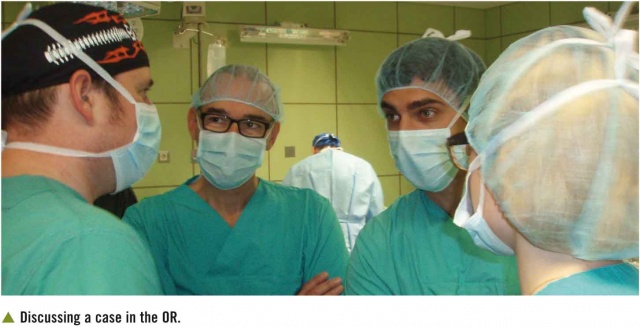
At the partly destroyed Tripolis International Airport, the immigration procedure did not last very long, we applied for visa weeks before in Austria. We were transported to our hotel in Tripolis, were we changed and were ready for the first contact with the local welfare organisations to give us a overview over the situation and the plans for the next days. We separated into two groups. One group went to Garian, a town approximately 70km in the south of Tripolis, the other group, including me, went with a resident/trauma surgery, one plastic surgeon and his resident, one anaesthesiologists, two psycologists and a OR-staff nurse to Benghazi. The next day, we flew again from Tripolis International Airport to Benghazi using Air Libya, an Airline on the Black List of the European Union for bad standards in maintaining and service of their airplanes. We landed save in Benghazi and started our visit of Benghazi Medical Center BMC immediately. The BMI is a relatively new complex with two main towers. It was built within the last ten years and the first tower was opened the year before the revolution started. The hospital is not bad equipped, many European and US-companies sold their products like x-ray-machines, surgical instruments or implants to the Gaddafi-Regime. The big problem in Libya: There are almost no more experienced doctors or nurses in the country. The doctors left Libya to work in foreign countries like Egypt or the United Arab Emirates or Quatar. The doctors in Libya have less experience, are quite young and did their residency abroad in Germany, Great Britain or Ireland – as visiting doctors. With the equipment they find in Libyan hospitals, they perform orthopedic and trauma standard procedures with (less) nailing and (some) plating but do not reach the mandatory medical standard of the countries they visited during their residency. Generally, they do not have the experience to treat severe cases like the complex injuries from bullets, shrapnels and mines they have to deal with during the civil war and the posttraumatic injuries in the months after the civil war like infections, severe deformities, nerve injuries and amputations. During the fights they had to operate on wounded and severe injured patient´s. In these days, they learned Advanced Trauma Life Support and damage control surgery – by themselves.
We met the surgeons of the hospital and soon it became clear, that they needed our help immediately, but it was very very hard for them to confess.
In the second tower of BMC, a Field Hospital of the Jordanian Royal Medical Services, sent by His Majesty King Abdullah II Ibn Al-Hussein to help the Libyan people, supported the regular BMC staff. Of course I contacted the head of the field hospital immediately to introduce myself. I met Dr. Ghaith Abou-Nouar, a Major and Orthopedic Surgeon who lived in Vienna/Austria for one year because of his training in orthopedic surgery, an arrangement of the Royal Jordanian Armed Forces and the Austrian Armed Forces to intensify their cooperation. Invited by the surgeons of the Royal Jordanian Medical Services, we worked together for the next 9 days in Benghazi.
We supported the outpatient´s clinic of the orthopedic and trauma unit at Benghazi Medical Center and scheduled operations for the next days. Every day, we treated trauma patients in the OR suffering from gunshot wounds they received during happy shootings which take place every night in Benghazi or direct assaults by rebels or other paramilitary units. In addition, we supported the emergency room doctors in doing resuscitation in the ER after ATLS (Advanced Trauma Life Support) which most of the doctors were completely not used to. In the Operating Theatre, we treated several acute and old fractures with the implants BMC could provide. To this time, many implants were not used by the local stuff because of lack of handling knowledge, including joint replacement for trauma. Orthopedic “Highlights” of our mission have been severe non-union and deformity of the elbow with radial and ulnar nerve palsy after gunshot injury 8 months ago, treated insufficiently with plates and screws, posttraumatic humeral deformities, large soft tissue defects of the hand after shrapnel injuries or lower limb destruction injury after EAD.
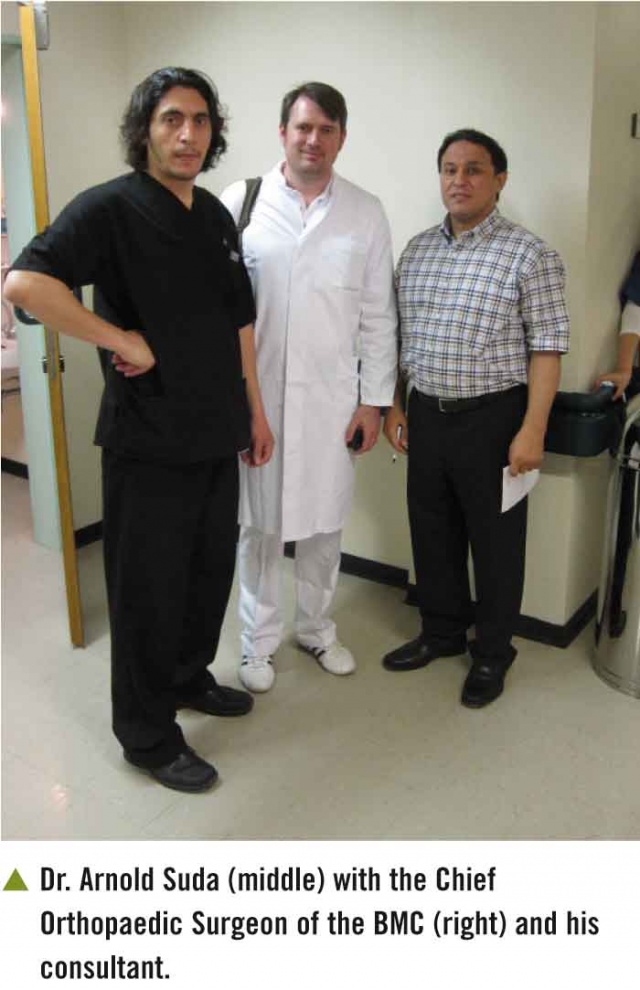
In summary, it can be stated that the situation in Libya is still very dangerous and completely confusing regarding the balance of power. The city of Benghazi is full of rebels, militiamen and, from time to time, policemen or members of the Free Libyan Army. Everybody has a gun, there are shootings every day and especially by night. There are new wounded every day, injured people because of traffic accidents – there is no authority regulating traffic or anything else. In the hospitals, doctors have some equipment, sometimes working, sometimes not.
In the past, Libyan doctors had very bad reputation. Not because of their skills, because of corruption and nepotism. Most of these doctors left the country or works in private hospitals. But in these private hospitals, only moneyed people are treated, so, most of the Libyans depend on the governmental hospitals with its doctors. These are sometimes trained abroad such as Great Britain or Germany, most of them had their training in Libya or only done a visiting fellowship in Europe. As a consequence and what the impression during our time in Benghazi was, that the surgical skills are barely trained, there is no maintenance or support of the big medical companies for CT-scans, surgical implants or other medical material.
If Libya becomes a more secure and stabile country, support from Europe is mandatory to establish a modern democracy in the European Union´s neighborhood. In this case, and only then, medical support can be provided in a useful way regarding education and training.
Date: 12/31/2012
Source: MCIF 4/12



